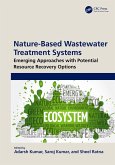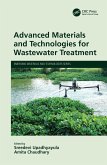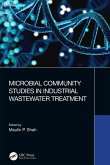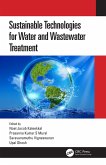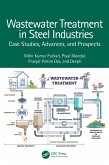Nature-Based Wastewater Treatment Systems (eBook, PDF)
Emerging Approaches with Potential Resource Recovery Options
Redaktion: Kumar, Adarsh; Ratna, Sheel; Kumar, Saroj
52,95 €
52,95 €
inkl. MwSt.
Sofort per Download lieferbar

26 °P sammeln
52,95 €
Als Download kaufen

52,95 €
inkl. MwSt.
Sofort per Download lieferbar

26 °P sammeln
Jetzt verschenken
Alle Infos zum eBook verschenken
52,95 €
inkl. MwSt.
Sofort per Download lieferbar
Alle Infos zum eBook verschenken

26 °P sammeln
Nature-Based Wastewater Treatment Systems (eBook, PDF)
Emerging Approaches with Potential Resource Recovery Options
Redaktion: Kumar, Adarsh; Ratna, Sheel; Kumar, Saroj
- Format: PDF
- Merkliste
- Auf die Merkliste
- Bewerten Bewerten
- Teilen
- Produkt teilen
- Produkterinnerung
- Produkterinnerung

Bitte loggen Sie sich zunächst in Ihr Kundenkonto ein oder registrieren Sie sich bei
bücher.de, um das eBook-Abo tolino select nutzen zu können.
Hier können Sie sich einloggen
Hier können Sie sich einloggen
Sie sind bereits eingeloggt. Klicken Sie auf 2. tolino select Abo, um fortzufahren.

Bitte loggen Sie sich zunächst in Ihr Kundenkonto ein oder registrieren Sie sich bei bücher.de, um das eBook-Abo tolino select nutzen zu können.
Giving an account of successfully applied and recently developed green remediation technologies for water pollution control, this book describes the scope and applications of nature-based wastewater treatment technologies for environmental sustainability.
- Geräte: PC
- mit Kopierschutz
- eBook Hilfe
- Größe: 19.57MB
Andere Kunden interessierten sich auch für
![Nature-Based Wastewater Treatment Systems (eBook, ePUB) Nature-Based Wastewater Treatment Systems (eBook, ePUB)]() Nature-Based Wastewater Treatment Systems (eBook, ePUB)52,95 €
Nature-Based Wastewater Treatment Systems (eBook, ePUB)52,95 €![Advanced Materials and Technologies for Wastewater Treatment (eBook, PDF) Advanced Materials and Technologies for Wastewater Treatment (eBook, PDF)]() Advanced Materials and Technologies for Wastewater Treatment (eBook, PDF)51,95 €
Advanced Materials and Technologies for Wastewater Treatment (eBook, PDF)51,95 €![Microbial Community Studies in Industrial Wastewater Treatment (eBook, PDF) Microbial Community Studies in Industrial Wastewater Treatment (eBook, PDF)]() Microbial Community Studies in Industrial Wastewater Treatment (eBook, PDF)48,95 €
Microbial Community Studies in Industrial Wastewater Treatment (eBook, PDF)48,95 €![Sustainable Technologies for Water and Wastewater Treatment (eBook, PDF) Sustainable Technologies for Water and Wastewater Treatment (eBook, PDF)]() Sustainable Technologies for Water and Wastewater Treatment (eBook, PDF)70,95 €
Sustainable Technologies for Water and Wastewater Treatment (eBook, PDF)70,95 €![Innovative and Hybrid Technologies for Wastewater Treatment and Recycling (eBook, PDF) Innovative and Hybrid Technologies for Wastewater Treatment and Recycling (eBook, PDF)]() Innovative and Hybrid Technologies for Wastewater Treatment and Recycling (eBook, PDF)52,95 €
Innovative and Hybrid Technologies for Wastewater Treatment and Recycling (eBook, PDF)52,95 €![Fate of Microplastics in Wastewater Treatment Plants (eBook, PDF) Fate of Microplastics in Wastewater Treatment Plants (eBook, PDF)]() Fate of Microplastics in Wastewater Treatment Plants (eBook, PDF)52,95 €
Fate of Microplastics in Wastewater Treatment Plants (eBook, PDF)52,95 €![Wastewater Treatment in Steel Industries (eBook, PDF) Wastewater Treatment in Steel Industries (eBook, PDF)]() Mihir Kumar PurkaitWastewater Treatment in Steel Industries (eBook, PDF)52,95 €
Mihir Kumar PurkaitWastewater Treatment in Steel Industries (eBook, PDF)52,95 €-
-
-
Giving an account of successfully applied and recently developed green remediation technologies for water pollution control, this book describes the scope and applications of nature-based wastewater treatment technologies for environmental sustainability.
Dieser Download kann aus rechtlichen Gründen nur mit Rechnungsadresse in A, B, BG, CY, CZ, D, DK, EW, E, FIN, F, GR, HR, H, IRL, I, LT, L, LR, M, NL, PL, P, R, S, SLO, SK ausgeliefert werden.
Produktdetails
- Produktdetails
- Verlag: Taylor & Francis eBooks
- Seitenzahl: 488
- Erscheinungstermin: 6. Dezember 2024
- Englisch
- ISBN-13: 9781040112441
- Artikelnr.: 72282494
- Verlag: Taylor & Francis eBooks
- Seitenzahl: 488
- Erscheinungstermin: 6. Dezember 2024
- Englisch
- ISBN-13: 9781040112441
- Artikelnr.: 72282494
- Herstellerkennzeichnung Die Herstellerinformationen sind derzeit nicht verfügbar.
Adarsh Kumar is engaged in understanding the role and mechanism of bacterial ligninolytic enzymes (Laccase, Lignin peroxidase, and Manganese peroxidase) in the degradation and detoxification of residual organic and inorganic pollutants from industrial wastewater and value-added product recovery. He has qualified National Eligibility Test (NET) for lectureship in 2016. Currently, he is working with the District Environment Committee, Pilibhit, UP, framed by the Department of Environment, Forest and Climate Change, Government of Uttar Pradesh, India and awarded as a certified Miyawaki Plantation Professional. He has published many scientific original research papers, book chapters, and proceedings magazines, as popular science articles in several peer-reviewed international and national journals. He has presented some papers at national and international conferences in his field. He has also served as a potential reviewer for various scientific journals in his research areas. He is a life member of the Association of Microbiologists of India (AMI), Indian Science Congress Association (ISCA), and International Society of Environmental Relationship and Sustainability (ISERS), India. Saroj Kumar is currently working on nature-based wastewater treatment technologies for sustainable wastewater management and resource recovery for the circular economy. The major research focus of Dr. Kumar is on the management of water resources, especially through constructed wetlands technology. He has qualified National Eligibility Test (NET) for lectureship and Junior Research Fellowship in the years 2015 and 2016 in Environmental Science, conducted by the Indian Council of Agricultural Research (ICAR, India) and University Grants Commission (UGC, India) respectively. He has published several articles in high-impact, peer-reviewed international journals, chapters with international publishers, and popular science articles in magazines. He has also presented several papers at national and international conferences, events, and training programs in India. He is an editorial member of the Journal of Plant published by Science Publishing Group, USA, and acts as a reviewer in several international journals. He is an active member of the Indian Science Congress Association (ISCA) and the Institute of Scholars (InSc), India. Dr. Kumar also received the Research Excellence Award from the Institute of Scholars India. Currently, he is working with the District Environment Committee, Lakhimpur Kheri, under the administrative supervision of the Department of Environment, Forest and Climate Change, Government of Uttar Pradesh, India. He is recognized as a certified Miyawaki Plantation Professional in India. Sheel Ratna is currently working on wastewater treatment through bacterial-assisted constructed wetlands, adsorbent columns, and the production of value-added products utilizing wastewater as a substrate. He has qualified for several national-level exams such as ICAR-NET (2016) in Environmental Science, ICAR-NET (2017) in Agricultural Microbiology, UGC-NET/JRF (2017) in Environmental Science and GATE-(2019) in Life Science. He has published several research articles in peer-reviewed international journals with high repute, and chapters with international publishers. He has also presented several papers at national and international conferences, and events in India. He is an active member of the Indian Science Congress Association (ISCA) and the Association of Microbiologists (AMI) of India.
1. Water present and future: Prospects for overcoming scarcity. 2. Nature-Based Wastewater Treatment Technologies: Concept, Understanding, Opportunities and Future Prospectus. 3. Constructed Wetlands as an emerging and effective wastewater treatment technology for decentralized locations. 4. Use of nature-based technologies for the treatment of wastewater from municipal slaughterhouse. 5. Use of plant-based coagulants for wastewater treatment in underdeveloped communities: sources, processes, effectiveness and associated mechanism. 6. Phytoremediation of organic and inorganic contaminants from industrial wastewater. 7. Activity and role of different extracellular enzymes for deterioration of pollutant within the root zone of macrophytes. 8. Integration of nature-based wastewater treatment technologies with other available technologies as a tertiary treatment unit. 9. Reuse of treated water for agricultural activities: Situation, opportunities and environmental risks and associated health problems. 10. PGPR of assisted phytoremediation of Industrial Wastewater for Environmental Sustainability. 11. Role of biosurfactant in wastewater treatment: Current research and future. 12. Microbial Adsorbent for heavy metal removal from wastewater for environmental safety. 13. Microbial-assisted phytoremediation of industrial wastewater recycling and reuses for overcoming water scarcity. 14. Wastewater treatment through exopolysaccharides-producing microbes. 15. Agro-industrial waste-based adsorbent for wastewater treatment: current pilot and industrial-scale applications. 16. Bacterial ligninolytic enzymes as green and versatile agents for wastewater treatment. 17. Application of water hyacinth in toxic metal phytoremediation with special reference to arsenic. 18. Wastewater remediation via Actinomycetes: Current trends and future prospects. 19. Integration of natural coagulants with heterogeneous photo-Fenton processes for an agro-industrial wastewater treatment. 20. Transitioning existing wastewater treatment systems toward a circular economy by increasing resource circularity. 21. Bioconversion of lignocellulosic waste: chemicals and biofuels biorefinery concept. 22. Agro-residue wastes as a key to unlocking future bio-energy potentials. 23. Circular Economy and Sustainability: The Role of Technology, Producers, Consumers and Policies to Achieve Sustainable Development Goals. 24. Constructed Wetlands Coupled with Microbial Fuel Cells for Bioelectricity Generation: Possible Applications and Challenges. 25. Nature Based Solutions: Circularity assessment through LCA approach. 26. Biorefinery: Algal-based valorisation of wastewater for nutrients recovery and energy production. 27. Bioconversion of lignocellulose: Current trends in biofuels, platform chemicals for biorefinery concept. 28. Macrophytes as a potential source of food and fodders for humans and animals due to their high biochemical composition. 29. Valorization of Bio-Based Waste through Research and Community Service in University towards Circular Economy Transition and Future Sustainability: Case Study in Indonesia.
1. Water present and future: Prospects for overcoming scarcity. 2. Nature-Based Wastewater Treatment Technologies: Concept, Understanding, Opportunities and Future Prospectus. 3. Constructed Wetlands as an emerging and effective wastewater treatment technology for decentralized locations. 4. Use of nature-based technologies for the treatment of wastewater from municipal slaughterhouse. 5. Use of plant-based coagulants for wastewater treatment in underdeveloped communities: sources, processes, effectiveness and associated mechanism. 6. Phytoremediation of organic and inorganic contaminants from industrial wastewater. 7. Activity and role of different extracellular enzymes for deterioration of pollutant within the root zone of macrophytes. 8. Integration of nature-based wastewater treatment technologies with other available technologies as a tertiary treatment unit. 9. Reuse of treated water for agricultural activities: Situation, opportunities and environmental risks and associated health problems. 10. PGPR of assisted phytoremediation of Industrial Wastewater for Environmental Sustainability. 11. Role of biosurfactant in wastewater treatment: Current research and future. 12. Microbial Adsorbent for heavy metal removal from wastewater for environmental safety. 13. Microbial-assisted phytoremediation of industrial wastewater recycling and reuses for overcoming water scarcity. 14. Wastewater treatment through exopolysaccharides-producing microbes. 15. Agro-industrial waste-based adsorbent for wastewater treatment: current pilot and industrial-scale applications. 16. Bacterial ligninolytic enzymes as green and versatile agents for wastewater treatment. 17. Application of water hyacinth in toxic metal phytoremediation with special reference to arsenic. 18. Wastewater remediation via Actinomycetes: Current trends and future prospects. 19. Integration of natural coagulants with heterogeneous photo-Fenton processes for an agro-industrial wastewater treatment. 20. Transitioning existing wastewater treatment systems toward a circular economy by increasing resource circularity. 21. Bioconversion of lignocellulosic waste: chemicals and biofuels biorefinery concept. 22. Agro-residue wastes as a key to unlocking future bio-energy potentials. 23. Circular Economy and Sustainability: The Role of Technology, Producers, Consumers and Policies to Achieve Sustainable Development Goals. 24. Constructed Wetlands Coupled with Microbial Fuel Cells for Bioelectricity Generation: Possible Applications and Challenges. 25. Nature Based Solutions: Circularity assessment through LCA approach. 26. Biorefinery: Algal-based valorisation of wastewater for nutrients recovery and energy production. 27. Bioconversion of lignocellulose: Current trends in biofuels, platform chemicals for biorefinery concept. 28. Macrophytes as a potential source of food and fodders for humans and animals due to their high biochemical composition. 29. Valorization of Bio-Based Waste through Research and Community Service in University towards Circular Economy Transition and Future Sustainability: Case Study in Indonesia.

